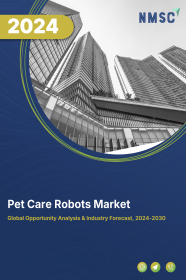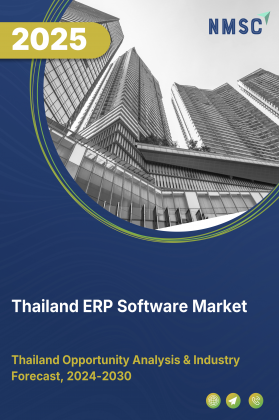
Pet Care Robots Market by Product Function (Feeding Robots, Entertainment and Play Robots, Monitoring and Recording Robots, and Others), by End‑User / Deployment Setting (Household, Veterinary Clinics, and others), by Distribution Channel (Online Retail, and Offline Retail), by Pet Type (Dogs, Cats, Birds, and Others), by Price Range (Low-End (< USD 100), Low-End (< USD 100), High-Range (USD 500-1,000), and High-Range (USD 500-1,000))-Global Opportunity Analysis and Industry Forecast, 2024–2030.
Industry: ICT & Media | Publish Date: 30-Aug-2025 | No of Pages: 898 | No. of Tables: 638 | No. of Figures: 579 | Format: PDF | Report Code : IC457
Pet Care Robots Market Overview
The global Pet Care Robots Market size was valued at USD 1.74 billion in 2023 and is predicted to reach USD 3.67 billion by 2030, registering a CAGR of 11.2% from 2024 to 2030. The pet care robots, also known as pet care bots includes a range of automated and semi-automated devices designed to assist pet owners in managing various aspects of pet care through advanced technologies such as artificial intelligence (AI), sensors, and others. These robots perform tasks including feeding, grooming, monitoring health, cleaning, and providing entertainment and companionship to pets.
One of the key components of the market include automated feeders, grooming devices, health monitoring robots, automated litter boxes, and interactive entertainment robots.
The market is driven by increasing pet adoption, growing awareness of pet health, and technological advancements, although high initial costs and reliability concerns pose challenges. While opportunities lie in developing multifunctional robots and integrating with smart home systems. There is a significant growth potential as these innovative solutions improve the quality of life for pets and offer convenience to pet owners.
Growing Pet Ownership Fuels the Demand for Pet Care Robots
The global rise in pet ownership, particularly among urban dwellers, is significantly boosting the demand for automated pet care solutions. As more individuals and families’ welcome pets into their homes despite time constraints and space limitations, the need for reliable and convenient care products has become increasingly apparent. This shift is especially pronounced among younger demographics, who are more likely to adopt pets and seek smart technologies to support their care routines.
Pet care robots offer a practical solution to manage various responsibilities such as feeding, monitoring, and entertainment, aligning with the lifestyles of busy pet owners. These technologies provide peace of mind by ensuring pets are cared for even in the owner's absence, thereby driving greater acceptance and demand. The emotional and mental well-being benefits associated with pet ownership further fuel the trend, with many consumers turning to robotic solutions to maintain and enhance the quality of life for their animals.
Increasing Demand For Autonomous & Personalized Pet Care Solutions
With pet owners leading ever‑busier lives, there’s a growing expectation that care devices should not just automate basic tasks but learn and adapt to each animal’s unique routines and preferences. Advances in onboard sensors, machine‑learning algorithms and adaptive scheduling now enable robots to automatically adjust feeding portions, play patterns and exercise reminders based on a pet’s age, weight, activity levels and behavior trends. This heightened autonomy and personalization boosts owner confidence—knowing the device can intelligently manage day‑to‑day care without constant human oversight—and drives faster uptake across diverse household types.
The High Cost Associated with Pet Care Robots Hinders the Market
Despite their benefits, the high cost of pet care robots remains a major barrier to widespread adoption. Many of these devices come with a premium price tag due to the integration of advanced sensors, AI capabilities, and autonomous features. For price-sensitive consumers or those unfamiliar with the long-term value proposition, the upfront investment can be a deterrent.
This cost-related challenge limits market penetration, particularly in regions where disposable income or awareness of such technology is low. While interest in robotic pet care continues to rise, manufacturers must address affordability through cost-effective innovations and broader consumer education to unlock full market potential.
The Integration of Artificial Intelligence (AI) Creates Opportunity for the Market
Artificial intelligence is playing a pivotal role in reshaping the capabilities of pet care robots. With AI, these devices can better understand pet behavior, personalize care routines, and respond dynamically to real-time data. This enables more accurate health tracking, adaptive feeding schedules, and intelligent interaction, significantly enhancing user satisfaction and pet well-being.
Furthermore, AI integration allows seamless connectivity with smart home systems, enabling pet owners to monitor and control care activities remotely. As AI continues to evolve, it will unlock new levels of automation and intelligence in pet care robots, opening up lucrative opportunities for innovation, product diversification, and market expansion.
North America Holds the Predominating Share in the Pet Care Robots Industry
North America currently dominates the pet care robot market share and is expected to maintain its leading position through 2030. This market dominance is driven by the region's large population of pet owners who are increasingly seeking innovative solutions to care for their furry companions. As per the report from American Pet Products Association (APPA) 2023-24, a national survey reveals that approximately 66% of households in the U.S. own a pet, totaling approximately 86.9 million households.
Moreover, the rising emphasis towards the development of pet care robots by the key companies, such as Ogmen Robotics, Rocki, Amazon and others drives the demand for the market. For instance, Ogmen Robotics launched the Oro Dog Companion Robot at CES 2024, an USD 800 pet care robot that cares for and engages dogs when owners are away. It uses advanced AI to detect signs of distress or boredom in dogs, responding with treats, play, or soothing music for comfort and entertainment. It integrates with a mobile app to monitor health records and schedules, providing a holistic solution for pet owners concerned about their dog's wellbeing.
Asia-Pacific Region Witnesses Fastest Growth in the Pet Care Robots Market
The Asia-Pacific region is experiencing rapid for pet care robots market growth, driven by increasing government initiatives and a rising number of households owning pets across the region. In 2022, South Korea estimated 6 million pet-owning households, accounting for approximately one in four households. Recently, the South Korean government announced an ambitious plan to grow the pet care industry to USD 11.5 billion by 2027, focusing on areas such as pet food, healthcare, services, and technology.
Furthermore, the aging population, facing physical limitations that hinder traditional pet care, is increasingly driving demand for automated assistance through pet care robots. These robots enable older pet owners to maintain their pets' well-being by automating essential tasks such as feeding, grooming, and monitoring. As per the Japan's government projections, the senior population (aged 65 and above) is anticipated to reach 37.16 million by 2030, accounting for 31.2% of the country's total population.
Competitive Landscape
The promising players operating in the global pet care robots industry includes, Sony, iRobot Corporation (Amazon Subsidiary), Roborock, PetSafe (Radio Systems Corporation), Petcube Inc., PetKit, Whisker, Enabot, VARRAM System Co., Ltd., Skymee, Dogness, Pumpkii Inc., RobotShop Inc., Smartpaw, CleverPet Labs , Pawbo Inc., among others.
These players are engaged in various business strategies such as product launches across various regions to maintain their dominance in the global pet care robots industry. For instance, in July 2025, iRobot Corporation (Amazon Subsidiary)Launched the Roomba Max 705 Combo+, featuring advanced AI navigation, 175× suction power, LiDAR sensors, and self-cleaning mop for improved pet hair removal and hygiene.
Also, in August 2025, RoborockLaunched the P-Series P20 Ultra Plus, a high-performance vacuum with hot water mop cleaning and 25,000 Pa suction for deep sanitization in pet households. Partnered with Chewy, making pet-optimized models like Qrevo Curv, Q8 Max, and F25 handheld vacuums available on the platform.
Moreover, in August 2025, Petcube Inc.The fountain was highlighted among the top pet tech gadgets of 2025 for its quiet operation, sterilization tech, and user-friendly design.
Pet Care Robots Market Key Segments
By Product Function
-
Feeding Robots
-
Entertainment and Play Robots
-
Monitoring and Recording Robots
-
Health and Wellness Tracking Robots
-
Grooming Robots
-
Cleaning Robots
By End‑User / Deployment Setting
-
Household
-
Veterinary Clinics
-
Pet Hotels and Boarding Facilities
-
Research and Educational Institutions
-
Other Commercial
By Distribution Channel
-
Online Retail
-
Company Owned Websites
-
Third-Party E-commerce Platforms
-
-
Offline Retail
-
Pet Specialty Stores
-
Supermarkets / Hypermarkets
-
Direct Sales
-
By Pet Type
-
Dogs
-
Cats
-
Birds
-
Small Mammals
By Price Range
-
Low-End (< USD 100)
-
Mid-Range (USD 100-500)
-
High-Range (USD 500-1,000)
-
Premium (> USD 1,000)
By Region
-
North America
-
The U.S.
-
Canada
-
Mexico
-
-
Europe
-
The UK
-
Germany
-
France
-
Italy
-
Spain
-
Denmark
-
Finland
-
Netherlands
-
Norway
-
Russia
-
Sweden
-
Rest of Europe
-
-
Asia-Pacific
-
China
-
Japan
-
India
-
South Korea
-
Australia
-
Indonesia
-
Singapore
-
Taiwan
-
Thailand
-
Rest of Asia-Pacific
-
-
Rest of World
-
Latin America
-
Middle East
-
Africa
-
Key Players
-
Sony
-
iRobot Corporation (Amazon Subsidiary)
-
Roborock
-
PetSafe (Radio Systems Corporation)
-
Petcube Inc.
-
PetKit
-
Whisker
-
Enabot
-
VARRAM System Co., Ltd.
-
Skymee
-
Dogness
-
Pumpkii Inc.
-
RobotShop Inc.
-
Smartpaw
-
CleverPet Labs
-
Pawbo Inc.
REPORT SCOPE AND SEGMENTATION:
|
Parameters |
Details |
|
Market Size Value in 2023 |
USD 1.74 Billion |
|
Revenue Forecast in 2030 |
USD 3.67 Billion |
|
Value Growth Rate |
CAGR of 11.2% from 2024 to 2030 |
|
Analysis Period |
2023–2030 |
|
Base Year Considered |
2023 |
|
Forecast Period |
2024–2030 |
|
Market Size Estimation |
Billion (USD) |
|
Growth Factors |
|
|
Companies Profiled |
16 |
|
Market Share |
Available for 10 companies |
|
Customization Scope |
Free customization (equivalent up to 80 working hours of analysts) after purchase. Addition or alteration to country, regional, and segment scope. |
|
Pricing and Purchase Options |
Avail customized purchase options to meet your exact research needs. |

















 Speak to Our Analyst
Speak to Our Analyst

























